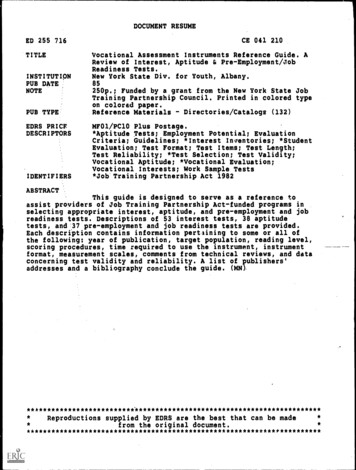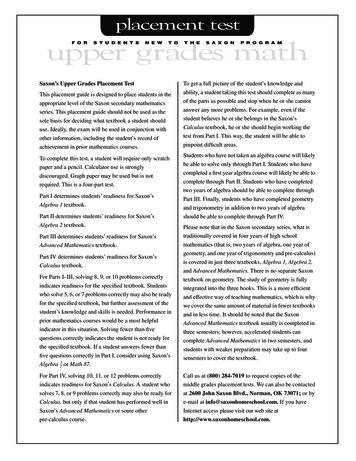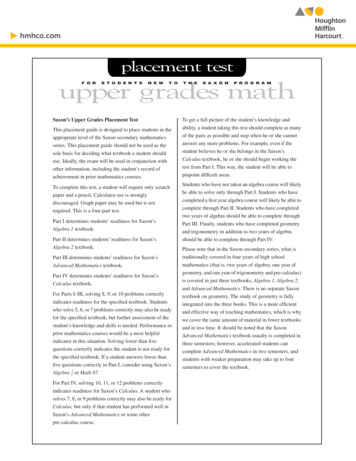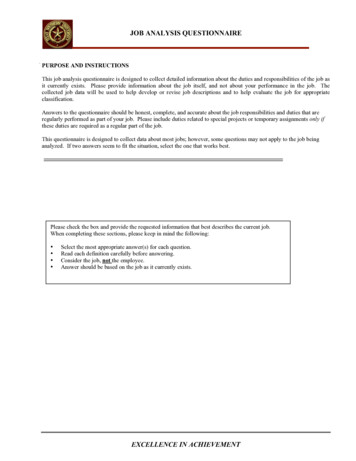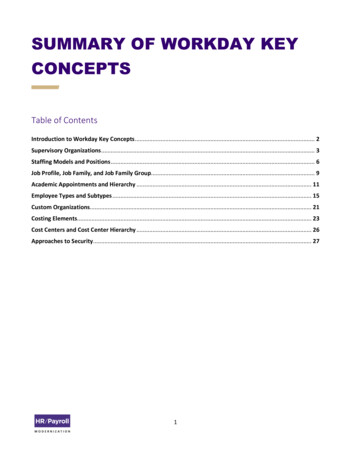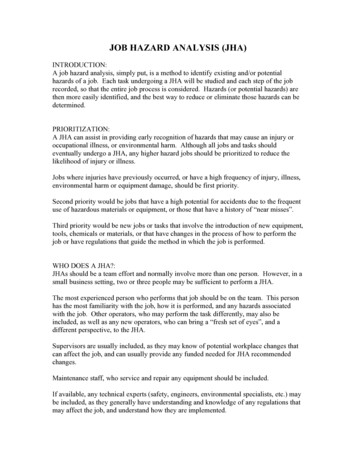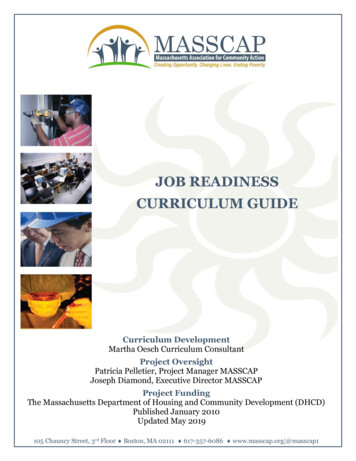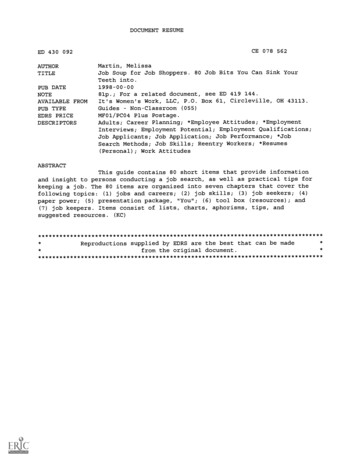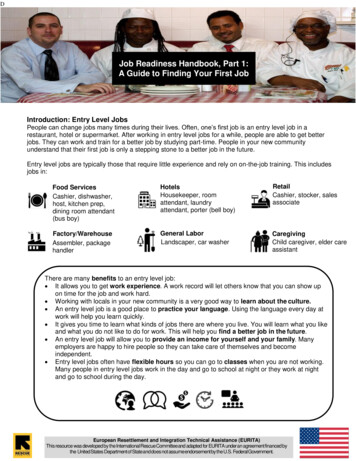
Transcription
DJob Readiness Handbook, Part 1:A Guide to Finding Your First JobIntroduction: Entry Level JobsPeople can change jobs many times during their lives. Often, one’s first job is an entry level job in arestaurant, hotel or supermarket. After working in entry level jobs for a while, people are able to get betterjobs. They can work and train for a better job by studying part-time. People in your new communityunderstand that their first job is only a stepping stone to a better job in the future.Entry level jobs are typically those that require little experience and rely on on-the-job training. This includesjobs in:Food ServicesCashier, dishwasher,host, kitchen prep,dining room attendant(bus boy)HotelsHousekeeper, roomattendant, laundryattendant, porter (bell boy)RetailCashier, stocker, salesassociateFactory/WarehouseAssembler, packagehandlerGeneral LaborLandscaper, car washerCaregivingChild caregiver, elder careassistantThere are many benefits to an entry level job: It allows you to get work experience. A work record will let others know that you can show upon time for the job and work hard. Working with locals in your new community is a very good way to learn about the culture. An entry level job is a good place to practice your language. Using the language every day atwork will help you learn quickly. It gives you time to learn what kinds of jobs there are where you live. You will learn what you likeand what you do not like to do for work. This will help you find a better job in the future. An entry level job will allow you to provide an income for yourself and your family. Manyemployers are happy to hire people so they can take care of themselves and becomeindependent. Entry level jobs often have flexible hours so you can go to classes when you are not working.Many people in entry level jobs work in the day and go to school at night or they work at nightand go to school during the day.European Resettlement and Integration Technical Assistance (EURITA)This resource was developed by the International Rescue Committee and adapted for EURITA under an agreement financed bythe United States Department of State and does not assume endorsement by the U.S. Federal Government.
Speak to your employment counselor if you have difficulties accessing transportation, childcare or familymember care. They can help you find solutions to overcome these barriers.When preparing for your first job, please keep the following in mind: Entry level jobs: Will probably pay minimum wageo Minimum wage means the lowest pay an employer can give you according to law.o The minimum wage is different for each country. Will be hard - you will have to work a loto If you prove to your manager that you are a good worker, you will get a pay raise and maybe abetter job in the future.o Your work history is very important. A good work history can help you get a better job in thefuture.o To have a good work history, you should: Be on time Never miss work Work hard Be friendly and nice to your colleagues and customers Will have different hours: morning, afternoon, evening o It is important that you are flexible with time when looking for your first job in your newcommunity.It is important that you get started on “the right foot.” Do not waste time trying to get a job that is out of reach foryou right now. Take an entry level job for six months or a year and then you will be ready for your next step! Anentry level job will: Help you get a better job in the futureo If you are a good worker, your manager can give you a promotion (better position in thecompany).o You could also find out about other jobs in the community. Your manager for your first job can be a reference to help you get your next jobo If you have a good work history, you can use your boss as a reference. People who have goodreferences can get very good jobs.European Resettlement and Integration Technical Assistance (EURITA)This resource was developed by the International Rescue Committee and adapted for EURITA under an agreement financed bythe United States Department of State and does not assume endorsement by the U.S. Federal Government.
Employment GlossaryReview and memorize these important employment-related terms:TermDefinitionAPPLICANT (or CANDIDATE)a person who asks for a jobAPPLICATIONa form that people fill out to ask for somethingAPPLYto ask for a jobAVAILABLEready to begin workBACKGROUND CHECKemployer checks on your criminal historyCOVER LETTERDEPENDABLEa document to provide additional information on the skills,experience and motivation of a job seekerthe money that the employer takes from a person’s pay fortaxes and insurancereliable, responsibleDESIRED SALARYmoney that a person would like to get for working a jobEDUCATIONschool experienceEMPLOYto give a person a jobEMPLOYEEa person who works for someone, a workerEMPLOYERa person who gives someone a jobEMPLOYMENTa job, workEMPLOYMENT AGENCYa company that finds jobs for people, some charge a feeEMPLOYMENT CONTRACTFULL TIME JOBa document you sign when you are offered a job whichdetails the terms of the job (duration, pay, etc.)work for 35 or more hours a weekHIREgive a job, employHOBBYan activity a person does for fun such as playing sports,gardening, or sewingDEDUCTIONEuropean Resettlement and Integration Technical Assistance (EURITA)This resource was developed by the International Rescue Committee and adapted for EURITA under an agreement financed bythe United States Department of State and does not assume endorsement by the U.S. Federal Government.
Employment Glossary (Continued)TermINTERVIEWDefinitionJOB TITLEa meeting with a manager; manager asks applicantquestionsthe name of a jobLABOR LAWSthe rights and responsibilities of a worker and their employerLABOR UNIONSa group of people who work to protect the rights of workersPART-TIME JOBwork for less than 35 hours a weekPERMANENT JOBa job which is expected to last a long timePOSITIONa job title, the name of a jobPREVIOUSbefore, in the pastQUALIFICATIONSskills needed for the jobQUALIFIED/QUALIFYwhen someone has the skills for the job; to have the skillsfor the jobwhy a person stopped working at a jobREASON FOR LEAVINGRECOMMENDED BY (ORREFERRED BY)REFERENCEhow a person heard about a jobRESUME/ CURRICULUM VITAE (CV)a person who recommends someone for a job based ontheir knowledge of the person’s professional experiencea summary of a person’s work experience and educationSALARYmoney that a person receives for work, wages, paySHIFTSKILLthe time of day that a person works (e.g., (day): 8:00 –16:00, (evening): 16:00 – midnight, (night, graveyard):midnight – 8AM)something that a person can do wellSTRENGTHSskills, positive behaviors, good things about a personSUPERVISORthe boss or manager on the jobTEMPORARY JOBa job which is expected to last a short timeVOCATIONAL EDUCATIONa skills training schoolWAGEthe amount of money you will be paid for working. It caneither be per hour, per month or per annum (e.g., 8 euro perhour, 1500 euro per month, or 18,000 per annum)all the jobs you have had in the pastWORK HISTORY (OR WORKEXPERIENCE)European Resettlement and Integration Technical Assistance (EURITA)This resource was developed by the International Rescue Committee and adapted for EURITA under an agreement financed bythe United States Department of State and does not assume endorsement by the U.S. Federal Government.
Job Readiness Handbook, Part 2:A Guide to Finding Your First JobJob Search ProcessThis guide covers the following steps needed to secure your first job:Step 1: Determine What Type of Job is Suitable for YouThings to consider when looking for a job:1. How many hours per week you will work: What is a full-time job? (F.T. or F/T)o 35-40 hrs/week What is a part-time job? (P.T. or P/T)o Less than 35 hrs/week; schedule changes What is an on-call job? (O.C. or O/C)o You only work when they need you What is overtime? (O.T. or O/T)o More than 35 hours in one weeko Pay is either 1.25 or 1.5 times your normal salaryo You can only work up to a maximum of 48 hours on average in a week per EU law What is a temporary job? (CDD)o Job which will not last a long time What is a permanent job? (CDI)o Job that is not going to end soono Temp to Perm- some jobs may allow you to work temporarily for a period before switchingyou to a permanent contract if they want you to continue. Seasonal Jobs hire for seasono E.g., summer (May-Sept)Complete for yourself: Can you work on-call shifts? Y/N2. Shift the time period during which you are at work Can you work night shifts? Y/N 1st shift day shift (6:00-18:00) Can you work part time? Full time?o Offices, Stores, Security Where can you work? (Name the 2nd shift swing shift (14:00-24:00)locations that you know you cano Stores, Restaurants, Security, Hospital, Factoriesaccess by public transportation. 3rd shift graveyard, nightshift (22:00-6:00)You may need to check the localo Security, Hospitals, Fire dept., Factoriestransport webpage to check the3. Transportation / Location routes.)How far is the job from your house?Is there a bus you can take to get to work on time every day?European Resettlement and Integration Technical Assistance (EURITA)This resource was developed by the International Rescue Committee and adapted for EURITA under an agreement financed bythe United States Department of State and does not assume endorsement by the U.S. Federal Government.
List of Personal QualitiesPersonal qualities are personal characteristics of an individual. They are what make up one's personality. Which words best describe you? Put a check next to 5 of these geticResponsibleEnthusiasticSeriousFast LearningStrongEuropean Resettlement and Integration Technical Assistance (EURITA)This resource was developed by the International Rescue Committee and adapted for EURITA under an agreement financed bythe United States Department of State and does not assume endorsement by the U.S. Federal Government.
Identifying SkillsBelow are 12 families of skills.Skills are things that you learned how to do through training or experience.Circle those which you have demonstrated ability, recently and in the past.1. Manual Skills:Finger speed and dexterity, assembling, building, fixing, repairing,operating tools or machinery, typing, filing, weaving.2. Outdoor Skills:Coordination and agility, swimming, hiking, climbing, camping,sports, farming, working with animals.3. Communication Skills:Writing, reading, public speaking, debating, teaching, foreignlanguage skills, reporting, publicizing, proof reading.4. Investigative Skills:Observing, inspecting, examining, researching, analyzing, problemsolving, classifying, diagnosing, evaluating.5. Intuitional/Innovating Skills:Imagining, inventing, designing, creating, improvising, developing.6. Human Relation Skills:Helping people, interviewing, listening, serving, taking care of,treating kindly.7. Leadership/ Management Skills:Initiating, organizing, leading, managing, coordinating, directingothers.Selling, promoting, fund-raising, negotiating, arbitrating, motivating,influencing.8. Persuading Skills:9. Numerical Skills:Computing, calculating, taking inventory, keeping financial records,managing money, working with statistics, budgeting, preparingfinancial reports.10. Performing Skills:Acting, singing, dancing, getting up before a group, making peoplelaugh, playing music, demonstrating products.11. Detail/Follow-through Skills:Following instructions, completing a task, paying attention to detail,organizing, being responsible, resourcefulness.12. Artistic Skills:Designing, drafting, illustrating, visualizing, decorating, drawing,painting, creating, composing.European Resettlement and Integration Technical Assistance (EURITA)This resource was developed by the International Rescue Committee and adapted for EURITA under an agreement financed bythe United States Department of State and does not assume endorsement by the U.S. Federal Government.
Step 2: Begin Looking For a JobWhere to Find Job Leads and EmployersFriends & FamilyThe BEST way to find a job is to have your friends and family help you find a job. They can help by taking youfor a job search, by asking their friends if they know of job openings and they can take you to apply for a job attheir workplace.Newspapers / Help Wanted AdsEmployers put hiring advertisements in the newspaper and look for workers. Look in the “Classified” section ofthe newspaper, you can find job listings under “Vacancies” or “Employment.”InternetMost companies post their openings either on their own website and/or on job search engines. If you know howto use the internet, you can fill out an online application or follow the instructions if they require you to emailyour CV and cover letter.Walk in/Call; Go to AgenciesGo to stores, restaurants, malls and staffing agencies to check if there are jobs available. If you see “We areHiring” signs, that means they are looking for workers.Job FairsThis is where a group of employers get together and recruit new employees. You will see announcements forJob Fairs in the newspaper, radio, online or TV. When you go, dress nicely, and bring many copies of your CVto handout to potential employers.Career or Job CentersThe local municipality or Regional Career Centers can help you look for a job. They also have job-relatedtrainings and other help available.European Resettlement and Integration Technical Assistance (EURITA)This resource was developed by the International Rescue Committee and adapted for EURITA under an agreement financed bythe United States Department of State and does not assume endorsement by the U.S. Federal Government.
Step 3: Fill Out ApplicationsApplying OnlineIn order to apply for jobs online, you are required to have an email account. Email accounts are free and youcan open one at any of these websites: Gmail, Yahoo or Hotmail.Some companies may request that you email them your resume or CV and/or a cover letter. You will need tosend it as a pdf or word document and should give it an easily identifiable title such as John.Smith9.3.18.docx.Read the instructions carefully.If your CV does not look similar to the example in Appendix 2, you can create a new one using the Europasstemplate found here or talk to your employment counselor and create one according to the standard in yournew community.Some online applications have an online assessment where an employer asks a series of questions which youmust either Agree or Disagree with or select a multiple choice answer. These assessments are used to filter outthe candidates whose personality or skillset does not match the job profile.European Resettlement and Integration Technical Assistance (EURITA)This resource was developed by the International Rescue Committee and adapted for EURITA under an agreement financed bythe United States Department of State and does not assume endorsement by the U.S. Federal Government.
Applying in PersonBefore you go in, you may want to call to check when they are open or when the manager will be available.Calling on the telephone takes practice. WRITE DOWN WHAT YOU WANT TO SAY BEFORE YOU CALL!When you go to ask for an application:Dress nicelySmileStand up straightLook the person directly in the eyeAsk for an application using this template to practice:1. Hello, my name is2. I am interested in applying for(Say what the job is or what the advertisement said)3. I have experienceI have worked as aI know how toFill out applications.You should apply for at least 2 jobs per day. Always bring your CV and documents with you.Asking for an application in person:“Hello. My name is . Is there a manager I can talk to about a job?”“Hello. My name is . Do you have any job openings I can apply for?”“Hello. My name is. Can I please have a job application?”ALWAYS SMILE AND SAY “THANK YOU”!Write down all employers you contact Fill out a JOB SEARCH RECORD (see appendix 1) every time you call about a job or fill out anapplication so you can keep track of the jobs you apply to. Use your job application sample information to fill it out. Read the whole application before you start to fill it out. Use a pen only (Not a pencil). Print or type your application. Print neatly and carefully. Always sign your application.European Resettlement and Integration Technical Assistance (EURITA)This resource was developed by the International Rescue Committee and adapted for EURITA under an agreement financed bythe United States Department of State and does not assume endorsement by the U.S. Federal Government.
Do not cross out words.If you make a mistake, complete a new application.DO NOT fill in sections that say: For office use only, For company use only, Do not write below this lineand do not write in shaded areasWhen you finish, return the application to the employer, SMILE and say THANK YOU!Sometimes, you will have to answer some questions. They will tell you that they will call or email you.Sometimes they do and sometimes they don’t. Do not stop and wait for them to call. Keep applying for otherjobs!Your Job Application SampleIf you have never filled out a job application or created a CV before, you should start by completing the basicinformation that will be required of you. This aining (start with most recent)FromToFromToFromToFromToSchool:Location: (city, town or country)Special subject:Diploma, degree or certificate:School:Location: (city, town or country)Special subject:Diploma, degree or certificate:School:Location: (city, town or country)Special subject:Diploma, degree or certificate:School:Location: (city, town or country)Special subject:Diploma, degree or certificate:European Resettlement and Integration Technical Assistance (EURITA)This resource was developed by the International Rescue Committee and adapted for EURITA under an agreement financed bythe United States Department of State and does not assume endorsement by the U.S. Federal Government.
Work Experience (Start with the most recent—your last job first)FromToYour job or positionName of employerSupervisorLocationYour dutiesWhy did you leave?FromToYour job or positionName of employerSupervisorLocationYour dutiesWhy did you leave?FromToYour job or positionName of employerSupervisorLocationYour dutiesWhy did you leave?FromToYour job or positionName of employerSupervisorLocationYour dutiesWhy did you leave?Special licenses, training or certificates(Examples: teacher training, registered nurse, electrician, carpenter, plumbing training, cooking school, commercialdriver’s license)References (Someone you know professionally who can speak about your skills - NOT a friend)NameWorkplaceTitleAddressPhone numberEmailEuropean Resettlement and Integration Technical Assistance (EURITA)This resource was developed by the International Rescue Committee and adapted for EURITA under an agreement financed bythe United States Department of State and does not assume endorsement by the U.S. Federal Government.
General Tips Print N/A if you cannot answer a question. After you complete the application, always check your answers. All applications have deadlines: it means the last day to apply. You must turn in your application before the deadline date. Some parts of the application are for the company or office only. If you make a mistake, complete a new application.VoicemailMake sure you have a phone number where the employer can reach you directly (not a friend) and ensure thevoicemail is set up so they can leave a message.Step 4: Follow Up on the ApplicationFill out a JOB SEARCH RECORD (see appendix 1) every time you call about a job or fill out an application soyou can keep track of the jobs you apply to.Call employers after you turn in the application to check the status of your application!Practice saying this until it is easy for you.“Hello. My name is. I filled out an application one week ago. I amcalling to check on the status of my application.”European Resettlement and Integration Technical Assistance (EURITA)This resource was developed by the International Rescue Committee and adapted for EURITA under an agreement financed bythe United States Department of State and does not assume endorsement by the U.S. Federal Government.
Step 5: Job InterviewAfter you fill out an application, the manager might call you to schedule an interview. You should ask for thisinformation:Always have a pen and paper by the phone. Write down all yourappointments and interviews.“What time is the interview?”“What day?”“Where will the interview take place?”“Who will interview me?”REMEMBER TO SAY THANK YOU!!!Congratulations! You have an interview for a job.You will learn about going for an interview, getting there, how to dress, the importance of body language, thekinds of questions you will answer, and the questions you can ask.Make Plans to Get There Get the street address and location and write it down.Get directions on how to get there and where to park.Arrange for childcare. Do not bring children or anyone else with you.Make sure you are early or right on time. Do not be late! If you are just 5 minutes late to the interview,you may not get the job!Dressing for an InterviewFirst impressions are very important. What you are wearing and how you look shows that you respect yourselfand the person who interviews you. Make sure you wear clothing appropriate to the work.Always take a shower before the interview.If you are a man, shave and trim hair.Brush your teeth.Clean your fingernails.Be neat and clean.Do not chew gum or smoke.Wear a little or NO perfume or cologne.European Resettlement and Integration Technical Assistance (EURITA)This resource was developed by the International Rescue Committee and adapted for EURITA under an agreement financed bythe United States Department of State and does not assume endorsement by the U.S. Federal Government.
Your Body Language Employers always pay attention to body language or what you do with your body in the interview. It is normal to be nervous at a job interview. Take a deep breath and try to relax. Even if you are nervous, act with confidence. Stand up straight and tall. Smile. Shake hands and wait to be asked to sit down. Look directly into your interviewer’s eyes. Answer questions with confidence in a clear voice. Think about your answers before you answer questions. Give answers that show that you have the qualities to do the job and you are eager to work. Speak in a voice that is easy to hear. (Do not speak softly.) Don’t ask about pay unless the interviewer asks you. Don’t put any of your personal items (hat, pocketbook, or bag) on the interviewer’s deskPractice AnsweringBefore the interview, start by answering these questions then practice them until they are easy for you.Do you have experience? Or, tell me about your work experience.Example response: Yes, I worked for 3 years in Iraq as an electrician.Your answer:Are you working now? (Respond yes or no. If yes, explain the situation.)Can you work full-time? (Respond yes or no. If no, explain why.)European Resettlement and Integration Technical Assistance (EURITA)This resource was developed by the International Rescue Committee and adapted for EURITA under an agreement financed bythe United States Department of State and does not assume endorsement by the U.S. Federal Government.
Do you have your own transportation? Or, do you have a driver’s license? (Respond yes or no.)Can you work in the evening? Or, can you work the night shift? (Respond yes or no. If no, explain why.)When can you start? Or, when are you available?Example response: I can start next week.Example response: I am available any day before 19:00.Do you have references? (Tip: you should always answer yes. Make sure to write down who those referencesare and have their information available.)What are your goals?Example response: I would like to get experience working in Germany and continue to improve my languageskills. Eventually I would like to get back into my field as an electrician.Once you have mastered those, practice answering these questions too:“Are you a team player? ““Why do you want to work here?”“Tell me about a time you had a conflict with someone and how you solved it.”“Tell me about a problem you had recently and how you solved it.”European Resettlement and Integration Technical Assistance (EURITA)This resource was developed by the International Rescue Committee and adapted for EURITA under an agreement financed bythe United States Department of State and does not assume endorsement by the U.S. Federal Government.
“Why should we hire you?”“What are your strengths?” (Tip: complete using the personal qualities and skills list)“What are your weaknesses?”“What would your last supervisor say about you?”Remember, these questions may be asked for an entry level job. If you have an interview for a more technicalor professional position, you should ensure you study some of the vocabulary associated with that field andconsult with your employment counselor.End of the InterviewAt the end of the interview, always ask some questions. It shows that you care about the job. Write them downahead of time so you won’t forget them.Here are some sample questions: What are the job duties? When does the job start? What are the hours? Do I need any special clothing for this job?The end of the interview is when the interviewer thanks you for coming in.You can ask these questions.“When will you make your decision about the job?”“Can I call you to find out about your decision?”“Thank you.”Shake hands, smile, and be sure to make eye contact!European Resettlement and Integration Technical Assistance (EURITA)This resource was developed by the International Rescue Committee and adapted for EURITA under an agreement financed bythe United States Department of State and does not assume endorsement by the U.S. Federal Government.
Step 6: Follow Up on the InterviewAlways send a thank you email to your interviewer within 24 hours of the interview. It makes a good impression.Here is a sample:Dear Mr. Smith,Thank you for talking with me yesterday about the position.I am very interested in working for your business and you can be surethat I will work very hard.I will call you to find out your decision.Sincerely,(Your name)If one week has passed and you have not received a phone call about the interview, you can email theemployer to check the status.European Resettlement and Integration Technical Assistance (EURITA)This resource was developed by the International Rescue Committee and adapted for EURITA under an agreement financed bythe United States Department of State and does not assume endorsement by the U.S. Federal Government.
Step 7: Get Hired and Start WorkingWhen you are offered a job, you will usually have to fill out a lot of paperwork and sign a contract. You will needto attend a training or orientation to learn more about the company and your job duties. Feel free to ask lots ofquestions to make sure you understand what is expected of you.In order to keep the job, it is important to understand and follow your company code of conduct. Here are someareas to consider in the workplace:Dress CodeBe sure to read the dress code for your work and come to work dressed appropriately.GenderKeep in mind that there is gender equality in the workplace. It is common for men to be supervised by women.Smoking and AlcoholEmployees are not allowed to smoke or drink alcohol while at work. Check the policies. You may be allowed tosmoke in designated areas while on an official work break.TimeTime is very important! Always be EXACTLY on time If you are late to work, you could get fired You are required to keep track of your time at work You may need to “clock-in” or “punch in” every dayStart using a calendar and schedule your work days.European Resettlement and Integration Technical Assistance (EURITA)This resource was developed by the International Rescue Committee and adapted for EURITA under an agreement financed bythe United States Department of State and does not assume endorsement by the U.S. Federal Government.
Appendix 1JOB SEARCH RECORDClient’s Name:Month/Year*Please indicate the total amount of time it took you to complete each activity including any travel time.DateContact InformationActivity/ ActionStatus/ CommentsEmployer/ Business Name1. Solicit applicationand Address2. Submitapplication/CV3. Interview4. Follow up5. Job fair/open houseName:Website:Address:Contact Name/Number:Name:Website:Address:Contact Name/Number:Name:Website:Address:Contact Name/Number:Name:Website:Contact Name/Number:Address:Name:Website:Contact Name/Number:Address:Name:Website:Contact Name/Number:Address:Client’s Signature:Date://European Resettlement and Integration Technical Assistance (EURITA)This resource was developed by the International Rescue Committee and adapted for EURITA under an agreement financed bythe United States Department of State and does not assume endorsement by the U.S. Federal Government.Total Time (hrs)
Appendix 2European Resettlement and Integration Technical Assistance (EURITA)This resource was developed by the International Rescue Committee and adapted for EURITA under an agreement financed bythe United States Department of State and does not assume endorsement by the U.S. Federal Government.
Often, one's first job is an entry level job in a restaurant, hotel or supermarket. After working in entry level jobs for a while, people are able to get better jobs. They can work and train for a better job by studying part-time. People in your new community understand that their first job is only a stepping stone to a better job in the future.

